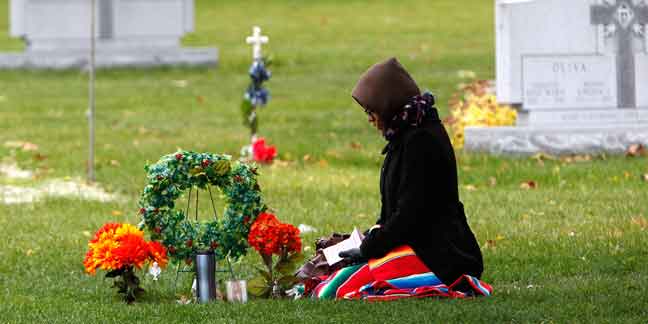 WASHINGTON, D.C. — A tricky thing about grief is that it is not a one-shot deal. Although it is often strongest when it’s first experienced, it can sneak up at any time. It especially reappears on the anniversary of the death of a loved one.
WASHINGTON, D.C. — A tricky thing about grief is that it is not a one-shot deal. Although it is often strongest when it’s first experienced, it can sneak up at any time. It especially reappears on the anniversary of the death of a loved one.
Some have labeled these days as “deathversaries” and even though they are days that can bring up painful memories, they should not be ignored nor do they need to be completely depressing.
The Internet, which is not always a place of solace, actually has plenty of advice for coping with anniversaries of a loved one’s death. Websites including www.modernloss.com or www.whatsyourgrief.com offer the following suggestions:
- Take flowers to the grave site or other place where you remember your loved one.
- Look at old photos and home videos or put digital photos into photo album.
- Volunteer with a charity or cause your deceased friend or relative liked or make a donation to the charity in his or her name.
- Reach out to someone else who also is grieving this loss.
- Host a dinner party and invite those who knew this person best and cook foods they liked or gather at the person’s favorite restaurant.
- Do something your loved one would have enjoyed.
- Write about your loved one; write them a letter or plant a tree in their name.
- Take the day off work.
- Ask friends or family members for support.
The Mayo Clinic, based in Rochester, Minn., notes on its website, www.mayoclinic.org, that reawakened grief can occur years after a loss, particularly when people are confronted with reminders of their loved one’s death.
The site advises people to be prepared, especially for anniversary reactions and to plan a distraction for the day or reminisce about the relationship. It reiterates some of the suggestions previously mentioned and also urges people to allow themselves to “feel a range of emotions. It’s OK to be sad and feel a sense of loss, but also allow yourself to experience joy and happiness. As you celebrate special times, you might find yourself both laughing and crying.”
“There’s no time limit for grief, and anniversary reactions can leave you reeling. Still, the intensity of grief tends to lessen with time,” it adds.
Many cultures celebrate the death anniversary of loved ones by gathering together as families and sharing special foods.
Catholics often mark the anniversary of a loved one’s death by attending Mass or having a Mass offered for the deceased.
Catholics also celebrate feast days which are the anniversaries of saints’ deaths. The anniversaries of deaths of loved ones will likely not be celebrated in the same manner as they are for major saints: with festivals and parades through streets, but recollections on this day share the same idea: recalling when one’s life on earth ended and eternal life began.
For many people, the idea of being festive on the anniversary of someone’s death is hard to imagine and might never happen, but for those grieving a loss there are signs that healing has begun and that comfort or renewed strength is present.
Father Eamon Tobin, pastor of Ascension Catholic Community in Melbourne, Fla., who wrote a parish column about coping with loss, says signs of healing after grief include:
- Being able to talk about your loved one in a more comfortable manner.
- Realizing that while “life is not the same, it can be good again.”
- Grief becomes less engrossing.
- New inner resources are developed or strengthened.
“Grief work, though very painful,” he writes, “is good and holy.”
The priest also wrote that “grief is the way God intended for us to deal with loss.”
He said the “world’s way is denial. It tells us to ‘move on’ even before we have started to grieve. Grief work (and it is work) is the only thing that will heal our loss or at least help us to live with it.”
— Carol Zimmermann, Catholic News Service
Pictured: A woman prays after placing flowers and statues of saints on her son’s grave at Queen of Heaven Catholic Cemetery in Hillside, Ill. (CNS, Karen Callaway, Catholic New World)


